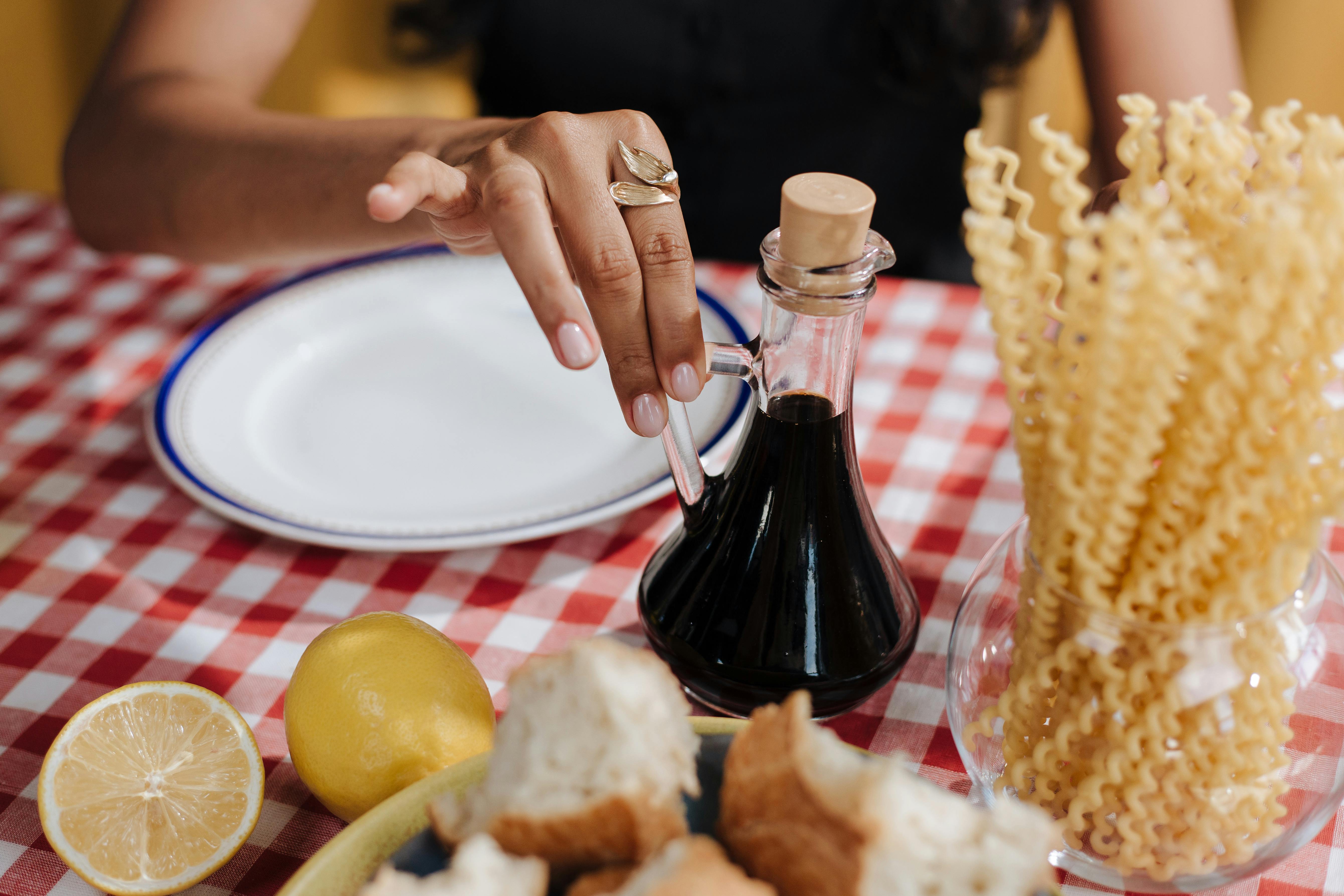Distilled vinegar is a pantry staple in many households, and it’s made from just two ingredients: water and acetic acid. Acetic acid is produced through a process called fermentation, which occurs when bacteria breaks down alcohol and turns it into acid. The acetic acid is then distilled to concentrate the acidity and create a purer form of vinegar. This distilled vinegar is the type most commonly used in cooking, cleaning, and preserving food.Distilled vinegar is a type of vinegar made by the process of distillation, which is the process of purifying liquids by heating them and condensing the vapor. It is usually made from grain alcohol, such as barley malt or corn, and can also be made from rice. Distilled vinegar has no color and a mild flavor, so it is often used in cooking and for cleaning purposes.
What Is White Distilled Vinegar?
White distilled vinegar is a clear liquid made from grain-based ethanol that has been distilled to produce a high-acid product. It is used in a variety of culinary, cleaning and medical applications. Vinegar has been used for centuries to preserve foods, pickle vegetables, and as an ingredient in sauces and salad dressings. It is also used as a natural cleaning agent due to its acidic properties. White distilled vinegar is made from ethanol that has been distilled to produce acetic acid, which gives it the sour taste and strong odor. The vinegar can be used as an all-purpose cleaner for hard surfaces such as countertops, sinks and stainless steel appliances. It can also be used in cooking recipes such as marinades, salad dressings and sauces. In addition, white distilled vinegar can be used medicinally for treating fungal infections of the skin and nails or for relieving itchiness caused by insect bites or stings.
How is White Distilled Vinegar Made?
White distilled vinegar is made by fermenting grain or alcohol into acetic acid. The acetic acid is then diluted with water to produce the vinegar. Depending on the type of vinegar, other ingredients such as herbs, spices and flavorings may be added. The most common base for white distilled vinegar is distilled alcohol made from grains like corn, barley, or rye.
The fermentation process begins with the breaking down of the carbohydrates in the grain or alcohol into simpler molecules of sugar or ethanol. This process is done by adding a bacteria culture to the liquid containing carbohydrates. The bacteria culture converts the carbohydrates into ethanol and acetic acid and also produces carbon dioxide.
The acetic acid produced during fermentation is then concentrated by distillation to produce white distilled vinegar. This process involves boiling the liquid until it evaporates and condenses in a separate chamber, leaving behind impurities that are too heavy to evaporate. The condensed liquid contains mainly water and acetic acid which is then cooled and bottled as white distilled vinegar.
White distilled vinegar can be used for a variety of purposes including cooking, cleaning,
What Ingredients Are In Distilled Vinegar?
Distilled vinegar is a type of vinegar made by distilling grain alcohol, usually from corn, rye, wheat, or barley. The process of distilling the grain alcohol removes the naturally occurring volatile acids found in regular vinegar. This gives distilled vinegar a more mild and less acidic flavor than regular vinegar. Distilled vinegar is also commonly used in cooking as an alternative to white wine or cider vinegars. It is important to note that distilled vinegar does not contain any added ingredients like sugar or salt. The only ingredient in distilled vinegar is acetic acid, which gives it its sour flavor and sour aroma. However, some brands of distilled vinegar may contain trace amounts of minerals, such as potassium and magnesium, depending on the type of grain used to make the alcohol.
Are There Any Health Benefits Of Distilled Vinegar?
Distilled vinegar, also known as white vinegar, is a popular household ingredient used for a variety of purposes. It is made by fermenting ethanol alcohol, which is derived from grain sources such as wheat, corn or rice. This type of vinegar has been shown to have a number of health benefits, making it an attractive option for those looking to improve their overall health.
Studies have found that distilled vinegar helps reduce LDL cholesterol (the bad kind) and triglyceride levels in the blood. Studies have also shown that it can help with weight loss by increasing satiety and helping to reduce appetite. Additionally, it has been found to reduce blood sugar levels in people with diabetes, making it an important part of a diabetic’s diet.
Distilled vinegar may also help improve digestion. It can help break down proteins and fats in the gut, aiding in digestion and absorption of nutrients from food sources. Additionally, some studies suggest that it may help reduce the risk of developing certain types of cancer due to its ability to inhibit the growth of certain cancer cells.
Finally, distilled vinegar can be used as

Can Distilled Vinegar Be Used For Cleaning?
Yes, distilled vinegar can be used for cleaning a variety of surfaces and objects in the home. Distilled vinegar is a natural cleaning agent that is made by fermenting grain alcohol and is perfect for tough jobs like removing dirt, grease, and grime from surfaces. It also works well for disinfecting and killing germs, as it has antimicrobial properties. Furthermore, distilled vinegar is non-toxic and does not contain any harsh chemicals, making it a safe option for cleaning around children and pets.
Distilled vinegar can be used to clean a variety of surfaces such as glass, counters, floors, tiles, sinks, bathtubs, toilets, grout lines, stainless steel appliances and much more. To use it for cleaning simply mix one part distilled white vinegar with one part water in a spray bottle. Spray the mixture onto the surface you wish to clean and let it sit for several minutes. After several minutes scrub the area with a sponge or cloth before rinsing off with warm water.
Additionally distilled vinegar can be used to remove stubborn stains from carpets or clothing. To do this simply mix
Uses of White Distilled Vinegar
White distilled vinegar is a versatile ingredient that can be used for many different purposes. It has a mild taste and can be used in a variety of ways, from cleaning and cooking to beauty and health care. In fact, white distilled vinegar has been used for centuries in many cultures for its health benefits. Here are some of its most common uses:
Cleaning: White distilled vinegar is a great multi-purpose cleaner. It can be used to clean windows, mirrors, countertops, floors, and more. It will remove dirt and grime without leaving behind any residue or harsh chemicals.
Cooking: White distilled vinegar is commonly used as an ingredient in salad dressings, marinades, chutneys, sauces, pickles, and other dishes. It adds a tart flavor to food that can enhance the overall taste of the dish.
Beauty Care: White distilled vinegar is a natural astringent that helps balance the pH level of your skin, making it an effective facial cleanser and toner. It also helps remove excess
Does White Distilled Vinegar Have An Expiration Date?
White distilled vinegar is a versatile household item with many uses. It is also known for having a long shelf life. So, does white distilled vinegar have an expiration date? The answer is yes, even though it can last for years.
White distilled vinegar is made from grain-based alcohol which has been fermented and then mixed with acetic acid. This gives it a strong acidic taste and makes it very shelf-stable. As long as the bottle remains unopened, white distilled vinegar can be stored for up to five years without any significant changes in flavor or quality.
After the bottle has been opened, however, the shelf life of white distilled vinegar begins to decrease significantly. The acetic acid content will start to degrade over time, resulting in a weaker flavor and aroma than when first purchased. For this reason, it’s best to use opened bottles of white distilled vinegar within six months of opening them.
In general, it’s always best to check the expiration date on any food or beverage product you buy before consuming it – even if it’s something like white distilled vinegar that usually lasts for

Conclusion
Distilled vinegar is a versatile substance with many uses. It is made by the fermentation of ethanol, which can be derived from any type of alcohol, including wine, beer, cider, or even grain alcohol. Once the fermentation process is complete, a liquid product called acetic acid is produced. This acetic acid is then diluted with water to create the final product known as distilled vinegar. It has many uses and can be used for pickling vegetables, as a cleaning agent, as a food preservative and even as a flavoring for various dishes. Distilled vinegar has been around for centuries and continues to be an essential ingredient in many households today.
Ultimately, distilled vinegar is an incredibly useful substance that has been used for centuries and still remains popular today. Its versatility allows it to be used in a variety of applications ranging from culinary to cleaning purposes and beyond. The fermentation process that produces it is simple and straightforward, making it easy to produce at home if desired. Whether you choose to buy it or make your own at home, distilled vinegar will always remain a staple in any kitchen or pantry due to its multifaceted uses.

